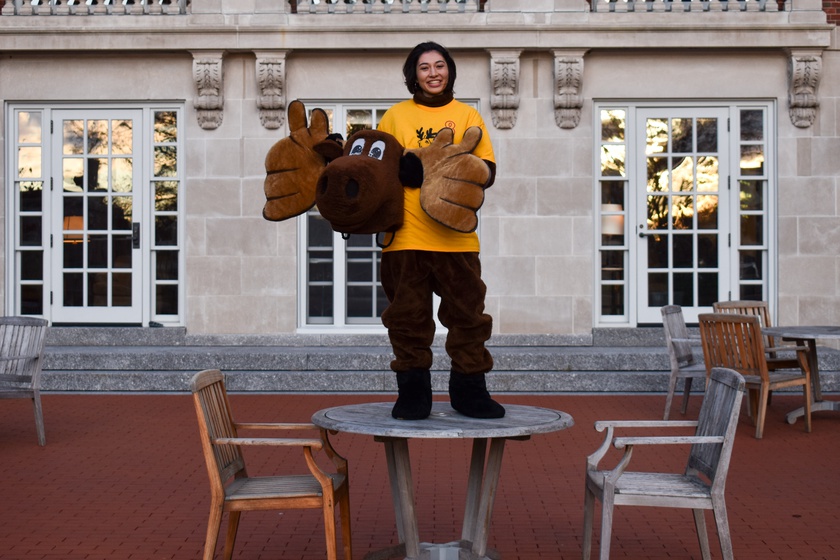{shortcode-5cdbf32a3421b35e7b0cc7b071bd2565a740c98e}
With a few minutes remaining in the intramural soccer game, Sam M. Woolf ’22 was tapped to sub in for Dunster. Her team was up 4-1 against Cabot, and she proceeded to play the “best minute and a half of soccer in my life,” she remembers. “I was flying across that field.”
Then an opposing player kicked the ball directly into her face from close range. Blood started gushing everywhere.
What at first seemed like a black eye turned out to be a broken nose and traumatic iritis. “My pupil was a horizontal oval instead of a circle,” she says. She shows me a picture of herself in recovery: eye patch, nose cast, grinning. A friend originally gave her the eye patch as a joke (“thank you Pierson!”) but it turned out to be useful when at first she couldn’t wear contacts in that eye, or glasses on her nose. Luckily, she says, her schedule this semester (“shoutout Expos 40. Kate is the best preceptor ever”) meant that she was still mostly able to participate in classwork.
Woolf emphasizes the support she felt from the Dunster community during her recovery. “People helping me out with ice packs, I got a card from Rachel, our house administrator,” she says. “Dunster is never short on love, but it was quite the experience.”
Now, three months after her injury, Woolf has been nominated for Most House Spirit. When our photographer and I meet her, she’s watching the sun on the river from a Dunster common room, standing next to a moose head costume. “These are for you,” she says, handing us two drinks: a mix of Raspberry Royale black tea, honey, half and half, and whipped cream.
Woolf tells me she was born and raised in Hamilton, New Jersey — the state “looks like an old man hunched over, and I live in his throat.” Since her junior year, she has also been one of Dunster’s IM representatives. Every week, Woolf spends eight to 10 hours publicizing events and attending games, sometimes in the moose suit.
When she became a rep, she says, all the events were remote because of Covid, which meant replacing volleyball or frisbee with events like wall-sitting competitions and “cookie face races” — trying to move a cookie from your forehead to your mouth using only facial muscles. By the time Woolf got back to campus, all the other reps had graduated. She recruited a few of her friends (“shoutout Alan and Kylie and Pierson!”) to help rebuild.
“We had no institutional memory of how IMs had been run, so we did our best to muddle through it,” she says. “And we got really lucky. There was a lot of buy-in from everyone in Dunster.”
{shortcode-342ea09cd5139bae84486663c740b7b7e0fdc050}
Buying in, as Woolf sees it, means engaging with House community without expecting much other than community in return. This is something I’ve been thinking about: how in contrast to the culture of hyperwork and pre-professionalism that permeates Harvard, IMs stand out as fun, low-stakes activities. Woolf is ahead of me.
“When I was a snotty sophomore going into junior year, I was like, ‘IMs? How’s this going to help me in the future?’” She laughs. “But then I actually did it and I was like, ‘Wow, this is great. My quality of life is so great right now.’”
Midway through the conversation, Jorge Mendoza, Dunster’s building manager, pokes his head in. Woolf and Mendoza talk for a little bit, and he lights up when she tells him what I’m interviewing her for.
“I can see why,” he tells me. “She’s awesome. She’s awesome.”
Woolf’s contributions to Dunster extend beyond IMs. Woolf helped write, direct, and starred in Dunster’s Housing Day video last semester, and she acquired Starbuck, the horse who appears in the video wearing fake antlers.
Orchestrating the Housing Day video aligned with Woolf’s academic interests — an English concentration with a Psychology secondary. “I want to write for the rest of my life,” she says.
Woolf just submitted her senior thesis, a screenplay that is in part a “ghost romance” and in part about loss, trauma, and family. “I want to believe in ghosts,” she says. “I like the idea of objects and places having memories. Maybe they’re not human ghosts.” (You could call them house spirits.)
{shortcode-49bb8a50a9fa87ffd39628401818b49b2e5b07b4}
This spring, Woolf was selected as a finalist for ScreenCraft, an international screenwriting competition, and some time afterward, a producer reached out to her to begin developing her entry. Like her thesis, this script maps its exploration of family onto a winkingly fantastical backdrop — in this case, exploring a father-daughter relationship and the death-by-asteroid extinction of the dinosaurs.
After this project, Woolf wants to keep screenwriting, and maybe act or direct as well. “House spirit” does not at all translate to these post-college plans, but that’s maybe the point.
“I think a lot of us spend a ton of time preparing to live,” she says.
“At the end of the day,” she says, “you might be participating in all these other extracurriculars and your classes and your really busy schedule that you’re trying to build up for your career. And the things that you really remember are, at least for me, sitting in a dining hall with your housemates and just talking.”
We’re outside in the Dunster courtyard. This deep into autumn, golden hour starts early, maybe 3:30 p.m. — but when we try to capture the light for the photo, the sun ducks back behind a cloud. That’s fine, anyway: Some things you have to be there for.
— Associate Magazine Editor Bea Wall-Feng can be reached at bea.wall-feng@thecrimson.com. Follow her on Twitter @wallfeng.


